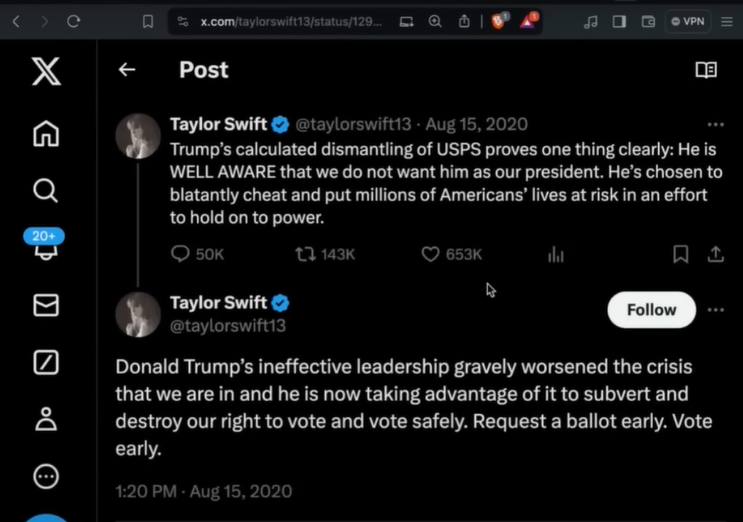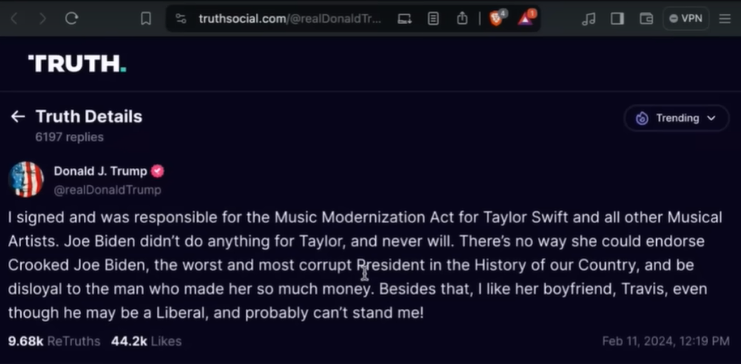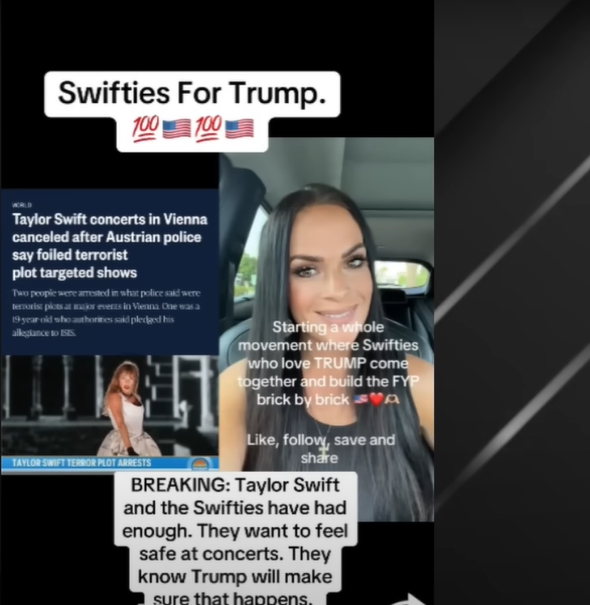In a political climate that thrives on unexpected alliances and viral movements, the latest twist in the 2024 U.S. presidential race involves none other than pop superstar Taylor Swift. While Swift has been known for her progressive stance and vocal support of Democratic candidates, a new narrative is emerging that has left both her fans and political pundits reeling: the rise of “Swifties for Trump.” Yes, you read that right. Donald Trump has playfully acknowledged this unlikely group, sending shockwaves through both the entertainment and political worlds.

But how did we get here? Let’s break down the series of events that led to this surprising development.
The Pop Star and the Politician: A History
Taylor Swift has not always been politically active, but when she stepped into the fray, she did so with a bang. In 2020, she endorsed Joe Biden, much to the delight of her progressive fanbase. Swift’s endorsement came with her characteristic flair—she even baked cookies for Biden’s campaign. During the same election cycle, she also took to social media to criticize Donald Trump, accusing him of attempting to dismantle the U.S. Postal Service as part of a larger scheme to undermine mail-in voting.
Her 2020 endorsement was seen as a key moment in the campaign, signaling that even pop culture’s brightest stars were aligning against Trump. Yet, in a move that no one saw coming, the narrative has shifted dramatically as we approach the 2024 election.
Trump Trolls Swift, and Swifties Respond
Fast forward to 2024, and it seems the tables have turned. Donald Trump, never one to shy away from a political jab, took to his social media platform to address Swift directly. In a post that quickly went viral, Trump acknowledged the Swifties for Trump movement, sarcastically extending an olive branch to the pop star’s fervent fanbase.

“I signed and was responsible for the Music Modernization Act. Taylor Swift, another musical artist, Joe Biden didn’t do anything for Taylor and never will,” Trump wrote. “There’s no way she could endorse crooked Joe Biden… Besides that, I like her boyfriend Travis even though he may be liberal—he probably can’t stand me. Oh well.”
Trump’s comment, as expected, sparked widespread discussion. Was he serious? Was this another one of his famous trolling tactics? Regardless of the intent, the post tapped into something deeper—an undercurrent of Swift fans who, despite their love for the pop icon, have grown disillusioned with the current political landscape.
The Rise of Swifties for Trump
Swifties for Trump, initially seen as a fringe movement, has gained traction in recent weeks. The movement started on social media, where some fans expressed frustration over security concerns at Swift’s concerts in Europe. These concerns, stemming from terrorist threats, led some Swifties to believe that Trump’s tough stance on national security would better protect their beloved singer.
In one viral post, a Swifty wrote, “If Trump was in office, this would have never happened. We need him back to make concerts safe again.”
This sentiment, while far from mainstream among Swift’s fanbase, has found a surprising amount of support. The movement has even garnered attention from conservative commentators, who see it as a sign of broader discontent with the current administration’s handling of national security.

A Cultural Shift Away from Wokeness?
One of the most interesting aspects of this phenomenon is its place within a larger cultural shift. In recent years, there has been a noticeable pullback from overtly “woke” politics, both in Hollywood and corporate America. Celebrity endorsements, once a staple of Democratic campaigns, have become less common, and many A-listers have distanced themselves from the Biden administration.
The Swifties for Trump movement can be seen as part of this broader trend. As the lines between entertainment and politics continue to blur, fans are reevaluating their loyalties—not just to their favorite artists, but also to their political beliefs.
The Politics of Celebrity Endorsements
Celebrity endorsements have long been a double-edged sword in American politics. While they can energize a candidate’s base, they also run the risk of alienating other voters. In Swift’s case, her endorsement of Biden in 2020 was celebrated by Democrats but criticized by conservatives, some of whom saw it as a sign of Hollywood’s disconnect from everyday Americans.
Now, with Trump playfully courting Swifties, we’re seeing the reverse scenario play out. Swift’s silence on the 2024 race has only fueled speculation. Will she endorse another candidate? Or will she choose to stay out of the political fray altogether?
For now, Swift seems content to let the drama unfold without her direct involvement. But in the age of social media, where even the smallest comment can go viral, her next move—whether it’s an endorsement or a carefully worded tweet—could have major implications.
Could Swifties Back Trump?
The idea of Swifties backing Trump may seem far-fetched, but in today’s unpredictable political climate, anything is possible. As the 2024 election approaches, the battle for the hearts and minds of voters will only intensify. And in a race where every vote counts, the Swifties for Trump movement, no matter how small, could be a factor.
But it’s not just about votes—it’s about narratives. In a world where social media often drives political discourse, the Swifties for Trump phenomenon is a reminder that pop culture and politics are more intertwined than ever before. What started as a joke or a fringe movement could very well become a talking point in the coming months, shaping the conversation in ways we can’t yet predict.
Conclusion: The Power of Pop Culture in Politics
At its core, the Swifties for Trump movement is a testament to the power of pop culture in shaping political narratives. In a world where celebrities wield significant influence, their fans can become unexpected political players. Whether or not Swift herself weighs in on the 2024 race, the conversation around her and her fans will undoubtedly continue to evolve.
As we head toward the election, one thing is clear: in the battle for public opinion, no one—pop star or politician—is off-limits.
